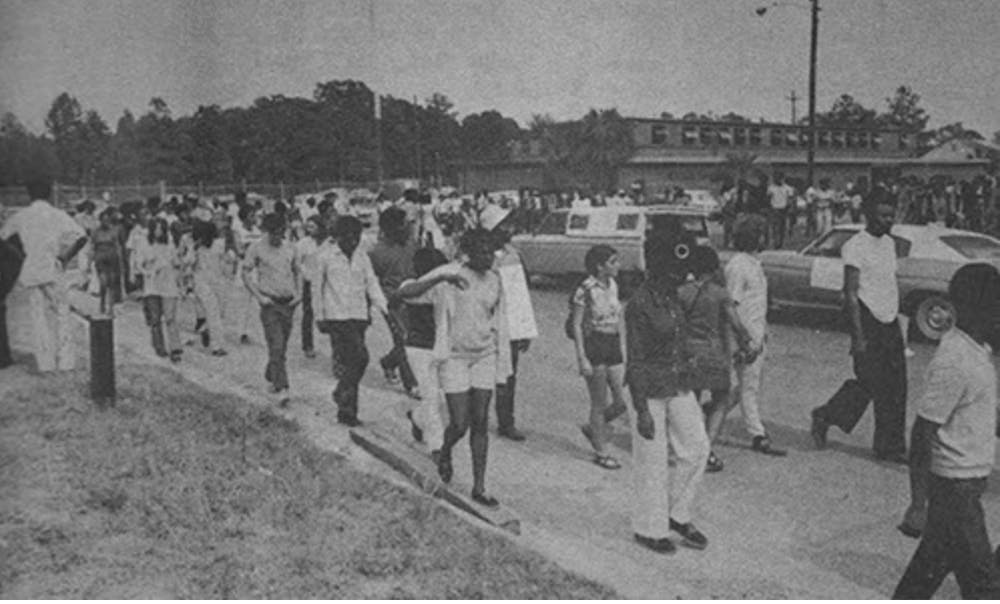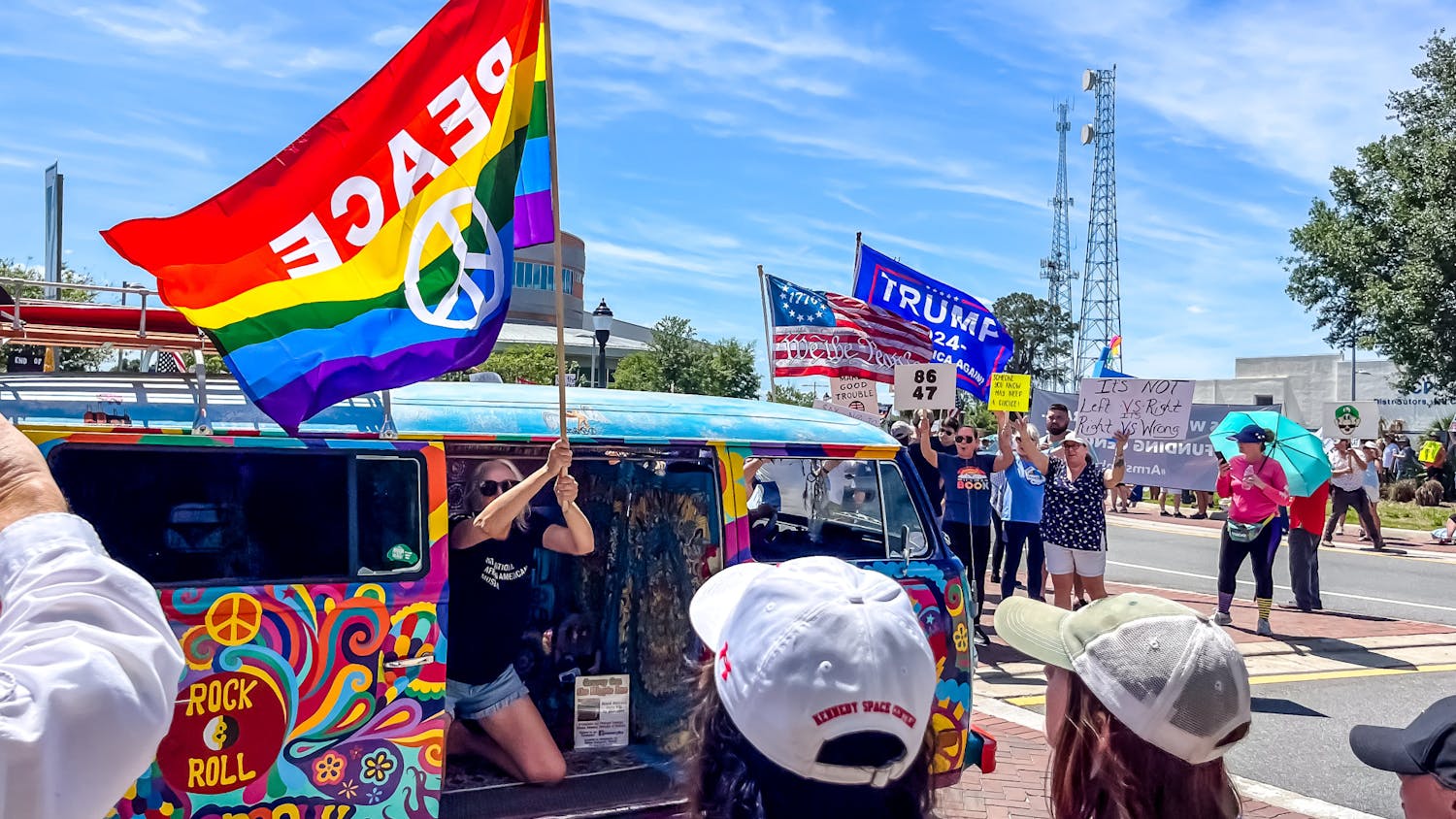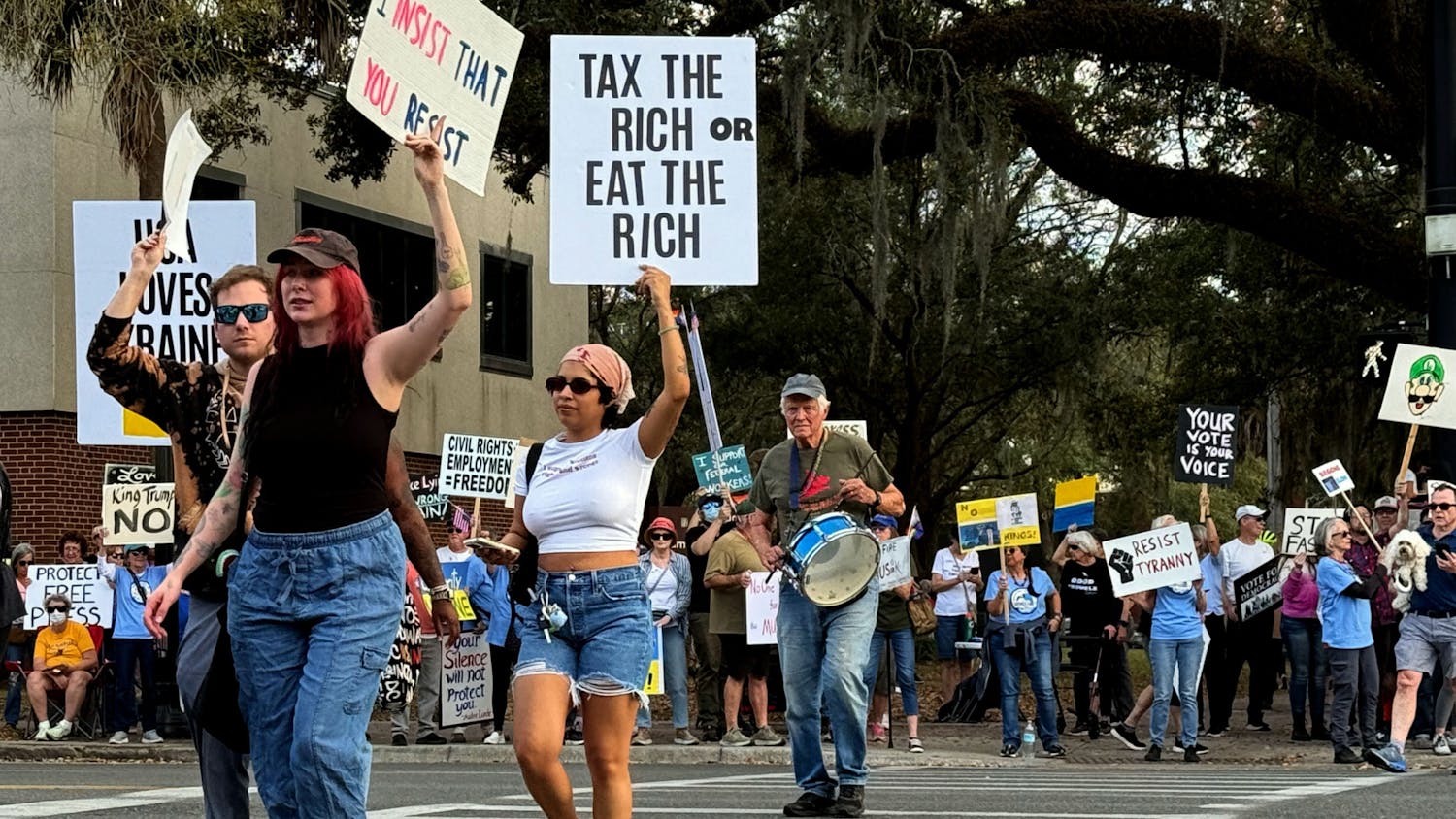Gainesville, May 1972. UF students packed the corner of University Avenue and Southwest 13th Street in a two-day anti-Vietnam War protest that clashed directly with police officers and campus officials. Nearly every week, there’s a protest on the corner of University and Southwest 13th Street — it’s one thing about Gainesville that’s never changed.
The city has a long history of protests. Beginning in the late 1960s, UF students took to the streets when they felt their voices weren’t being heard. Six decades later, students and Gainesville community members still gather in masses to ignite change.
UF history professor Steven Noll has watched city protests since he started teaching in Alachua County in 1976. Over time, they’ve become more peaceful, he said.
“Students had been taking to the streets since 1967 — huge demonstrations in ’69 and ’70, Black Thursday in ’71,” Noll said. “Students felt that their voice wasn't being heard and they needed to ramp up the confrontational possibilities.”
The beginnings of Gainesville student protests
In the years leading up to the 1972 May riots, as some students from the time referred to them, there were several protests. On Oct. 15, 1969, about 1,800 UF students gathered at the Plaza of the Americas to protest the Vietnam War. The Student Mobilization Committee sold red and black armbands with “644,000” on them, representing the estimated number of United States casualties in the war.
In May 1970, UF students requested that then-University President Stephen O’Connell cancel classes in honor of the victims of the Kent State shooting, but he refused. It’s estimated that 3,000 UF students protested, causing classes to be canceled for two days.
On April 15, 1971, the Black Student Union marched to O’Connell’s office with a list of demands. Exactly 66 students were arrested and suspended. That afternoon, 1,000 students gathered at the Plaza of the Americas to raise bail money for the arrested students, and by 9 p.m. that same day, another 1,000 students sat on O’Connell’s front lawn, demanding his resignation.
The rage that filled students came to a head in May 1972, and nothing could get them off the streets. Samuel Taylor, UF 1972 student body president, tried, but they refused.
Students didn’t budge when fire trucks were brought in to spray them off the street — in fact, this only made the crowd larger as it provided sweet relief to the sticky May weather. Students weren’t strongly affected by the tear gas police officers threw because the officers were standing downwind, and it backfired.
“With the Vietnam War, there was always the fear of them having to leave school and then being drafted and sent over to Vietnam,” Noll said. “Their friends were getting drafted. Their friends were dying, and it didn't appear that there was any good rationale for the war.”
The anti-war protests were violent because the war hit close to home for younger generations, he said. They were violent because university students were targets of violence themselves, like victims of the 1971 shootings at Kent State University and Jackson State University, he added.
Gainesville’s activism didn’t stop at anti-war protests. The city was an important component of the national women’s rights movement in the ’60s and ’70s, Noll said. Gainesville is one of five cities pinpointed as hotspots of feminist activism with two activists — Beverly Jones and Judith Brown — writing an influential manifesto, “Toward a female liberation movement.”
Students and residents carried the activist sentiment to the 1980s, as the anti-apartheid movement gained traction and the U.S. and the United Kingdom imposed selective economic sanctions.
In the 1980s, UF students and citizen activists performed a 40-day sleep-in and protest on the lawn of Tigert Hall to urge the university to divest funding from companies that supported the South African Apartheid.
Modern-day protests
During Fall 2023 at UF, The Alligator covered significant Israeli and Palestinian protests. Although these protests have remained peaceful, there’s been a rise in antisemitism and Islamophobia, creating a rise in tension.
“We have seen the Israeli flags defaced. We've seen students of Arab descent harassed,” Noll said. “The tensions for that, I think, really have the potential to match the violence that took place in the ’60s and early ’70s.”
Muhannad Farahat, a 22-year-old UF civil engineering senior, has participated intermittently in protests since 2021. This semester he’s attended four, he said.
“I don't think most protests that have ended in violence have really succeeded in any way,” he said. “Violence is never the way to do it. It's to do it peacefully, and try to get your message across in a good way because a lot of people are more receptive in that sense.”
Protesting isn’t just about creating change; it’s also about opening up an educational dialogue, Farahat said. Protesting shows university and community leaders there needs to be some kind of change, he added. Protesting at the entrance of campus gives organizers a better opportunity to expand their platform.
Organizing a protest on the busiest corner in Gainesville allows for visibility a demonstration within campus may not get, Gainesville Mayor Harvey Ward said.
“It's visible. There are more people there, it's more dense than anywhere else in North Florida,” Ward said. “It's going to always draw the most attention. So, it's significant from that purpose, but also from the symbolic connection of the university then into the community.”
Ward grew up in Gainesville and, as a child, watched the raging anti-war protests in the city. Now, as mayor, city leaders work with protest organizers and police departments to create a safe environment for protesters to exercise their First Amendment rights, he said.
Gainesville is a mix of a normal Florida city and a major university that attracts students from all over the world, which brings a wide diversity of thoughts to town, he said.
During his time in Gainesville and as mayor, Ward has watched protests across the board unfold. During Summer 2020, Black Lives Matter demonstrations broke out across the city and continued for months and during Summer 2022, community organizers led protests over the handling of Terrell Bradley’s case, a Gainesville man who lost his eye to a Gainesville Police Department K-9. Hundreds marched in May 2022 to support abortion rights. In 2021, anti-vaccine protesters gathered outside City Hall to fight against a vaccination mandate.
“As a community, it shows that we're tolerant and that we really do believe that people have a right to be heard,” Ward said. “We have shown in Gainesville that we think the First Amendment matters and we're here to support people's rights.”
Contact Ella Thompson at ethompson@alligator.org. Follow her on Twitter @elladeethompson.
Ella Thompson is the Spring 2025 Editor-in-Chief and a fourth-year journalism major. She also worked as the Fall 2024 Digital Managing Editor and the Spring 2024 metro editor. In her free time, she can be found reading, planning a trip or journaling.






